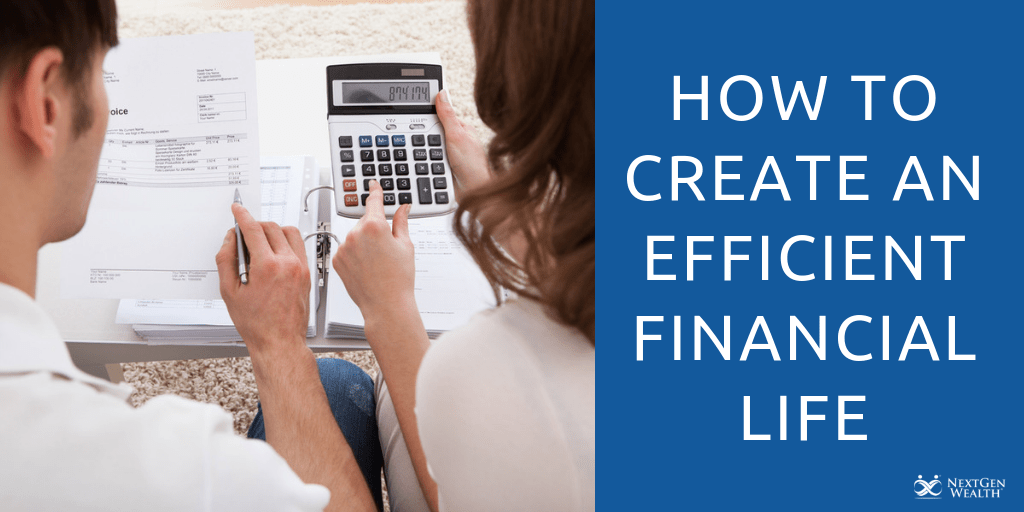How To Create An Efficient Financial Life
Organizing your financial life is a fundamental, critical step for wealth building. Establishing a budget, planning your savings and ensuring you are preparing for retirement now secures your future and ensures you stay on track to meet your personal financial goals. Given the plethora of financial advice available, it can be difficult to find and develop the right plan for you. 
There are some fundamentals that can be applied to anyone’s financial situation though, and creating an efficient financial life is as much about getting started as it is maintaining smart financial planning and decisions. Here is our brief guide to creating an efficient financial life that meets your needs.
Establish And Stick To A Budget
Let’s begin with the basics. Developing a budget is where you begin to start to establish an efficient financial life. Budgets help you monitor and control your spending. The first rule of wealth building is you must have more money coming in than you have going out.
Budgeting also makes it much easier to prioritize your spending so that you can maintain the lifestyle you want and keep all the bills paid. Growing your own financial future through wealth building is also much easier when you already have an established plan for how you spend your money.
As you plan your budget, be sure to write everything down on paper, in a spreadsheet or a mobile app. When you can see where your money is going outside of your own head, it makes it easier to focus on what’s most important for your long term financial benefit.
You may have the means to dine out at a restaurant nightly, but is it a wise choice given your long term financial goals? Planning to take a vacation? Plan a vacation fund into your budget so you can avoid incurring debt and paying interest on your getaway. Managing your personal spending is fundamental to both wealth building and establishing financial freedom.
Automate Your Financial Life As Much As Possible
Paying bills on time not only builds your credit, but it also helps you to maintain your creditworthiness for secured and unsecured debts. Configuring automatic payments (which most creditors offer) is the most efficient means of keeping your credit rating in good standing. If one of your creditors or a utility/service company doesn’t offer automatic bill pay, you can often configure something through your bank’s website to send out paper checks directly from your account each month.
It may sound obvious, but you also need to keep in mind that automatic payments are automatic. Remember to enter debits to your account on your bank ledger or financial app as soon as they are withdrawn.
This will prevent overdrafts and help you stay on top of your monthly expenses. Moreover, many lenders and service providers also offer a monthly discount on your interest rate or payment total if you use an automated payment system.
If you don’t currently use automatic bill pay through your creditors and service providers, find out what options and/or benefits they offer for setting up automatic payments. Not having to remember to cut a check or login to a website or mobile app to make payments monthly saves time and money.
It also can have a positive impact on your credit score. All in all, automated billing makes the most sense for an efficient financial life.
Revisit Your Budget On A Monthly Basis
Bills can change each month. Sometimes there are service provider rate increases, other times your utility usage goes up as the weather changes each season. If you are using automatic payments, not reviewing your budget could result in expensive overdrafts and late fees.
To avoid this scenario, be sure to check your billing statement as soon as it is sent to you. You can update your budget for the month accordingly, and you can avoid those unpleasant financial surprises that often pop-up unexpectedly.
Keeping an eye on your expenses and bills is key to keeping more of your money and consistently putting money into savings. It may seem tedious and inconvenient, but it can also save you significant money month over month.
Monitoring your budget monthly also helps you to keep a sufficient bank balance to maintain your creditworthiness, too. For example, if your energy bill is $100 higher because the summer heat was especially intense, you can look at your budget to see where that extra $100 will come from to keep your budget balance.
Maybe you skip those two nights you planned for dining out with your family or significant other and instead plan some less expensive or free activities. Packing a lunch and going for a hike is excellent bonding time, and it usually costs far less than a meal at a restaurant.
I also highly recommend setting up level bill pay for your utility bills. By setting up level bill pay, you will know exactly what your utility bills will be every month without the large spikes in the summer and winter. This makes managing the budget much easier.
Put Savings First
Many financial experts like to refer to putting money into savings as “paying yourself first.” It’s a wise idea to set up a direct deposit for a percentage of your earnings to go straight to your savings account each month before you ever see it in your checking account.
You may want to keep this savings account completely separate from your checking account, too. If you can’t just click or tap a few buttons on your banking app or website to take money out of savings, you are much more likely to leave it alone.
Some savings should also be going towards stable investments or retirement plans as well. The small increments you transfer automatically every time you deposit money can add up quickly, and before you know it you have plenty of savings for unexpected expenses or emergencies.
Cash in the bank provides much greater career and financial freedom, and a well-thought-out personal savings plan is integral to any efficient financial life. Moreover, providing yourself with financial peace of mind means you are confident that no matter the setback or emergency, you’ve got cash in the bank. Pay yourself first, and give yourself the gift of financial freedom.
Keep Track Of Your Spending
Part of keeping your budget balanced is keeping track of what you spend your money on daily. An efficient financial life does not involve the frequent asking of the question “Where did my money go?”
Whether it is debit, cash or credit, you need to record every outgoing transaction to compare with your account statements. Keeping receipts is all well and good, but if you just toss them in an old shoe box or a file folder you aren’t doing yourself any favors. The good news is there are many apps that make expenses and spending tracking quick and easy.
Mint, Quicken, Personal Capital and Tiller are all excellent apps for mobile devices and your computer that make recording your spending habits a matter of a few clicks. Some of them actually have Optical Character Recognition (OCR) capabilities, so you can snap a picture of your receipt and it will create an entry in your digital ledger for you.
If you’re an old school methods person, you can also use a simple pocket checking ledger, lined notebook or a spreadsheet to keep track of spending, too. Consistency is the key with this component of an efficient financial life.
You need to develop the habit of entering your spending into your preferred tracking method every time you spend money. Yes, it means a little more work on your part, but staying on top of your spending and sticking to your budget will save significantly more money than the time you spend to write down your spending.
Organize Your Financial Files Into One Place
As environmentally friendly as a paperless world would be, it’s not here yet. Even with the proliferation of cloud storage and online account access, there are still financial documents you must keep in physical form. To do this properly though, you need to choose and establish a filing system that suits your lifestyle and that you know will be convenient enough for you to use consistently.
If a banker’s file box is what works for you, go for it. Organized shoe boxes of papers and receipts sound good to you? Make it happen. Prefer filing cabinets because they protect documents more effectively? Get some file folders and tabs and you’re ready to go.
Even if you just keep a specific box for receipts and documents, financial information, medical insurance information and other tax-time documents, you need to do that. So long as you are storing those important documents, receipts and papers in the same place, you can find them again when you need them.
If for no other reason, keep a financial documents box for tax time. The more information you have to give your tax preparer or accountant come tax time, the more efficient your taxes can be figured. It may seem like a tedious hassle, but that small investment of time to store and organize your financial files can mean a big payoff later.
Keep Financial Documents Up To Date
Meeting with your accountant and an attorney to update your personal financial documents annually for an hour is a smart investment in your efficient financial life. You may want or need to update beneficiaries for your investments, retirement accounts and tax deferred savings plans.
Checking, updating or writing a will is extremely important to ensure that all your hard-earned resources and wise investments do not go to waste in the event of your untimely death. Moreover, you want to do regular estate planning as your holdings increase and you continue to build and maintain your wealth.
It’s also smart to review automatic payments and direct deposits with your financial adviser or accountant annually, too. This ensures you stay on top of payments and utilities.
If you have investment assets, you may want to meet with your financial advisor more frequently to make sure your money is invested correctly according to your goals. With your financial freedom and independence on the line, most people cannot afford to skip meeting with their financial planner once a year.
Set Goals and Track Your Progress
If your objective is to build wealth and maintain it so you can live the life you choose, you need to set goals and track your progress. Working toward a goal with nothing specific written down can make tracking your progress next to impossible. Establishing goals for your financial future should be broken down into three categories: short term, medium term and long term.
Short term goals have a timetable of less than a year, and should be achievable within that time frame. Saving for a nice vacation or an important event fall under the short term goal category.
Medium term goals are on the 1-5 year scale, and you should set your sights on goals you can achieve in that time period. Saving for a down payment on a house or a new car, a recreational vehicle, boat, or renovations for your home fall into this category.
Last but not least, we have the long term goals. These are on a timetable greater than five years, so they should be aligned with goals that require extended time to accomplish. Making sure your retirement is 50% funded by a specific future date would fall under the long term goals category.
Regardless of what goals you choose to set, you need to have these goals in place. They will keep you motivated to stick to your plans and see yourself through to financial freedom.
If you want to build wealth that will weather the storms and setbacks life sends your way, establish an efficient financial life using the principles discussed in this guide. Once you build these healthy financial habits, you will find it much easier to achieve your financial goals and live a life of financial freedom and security.

